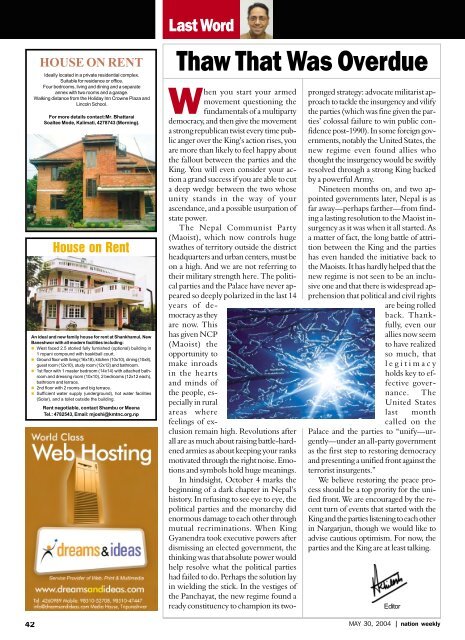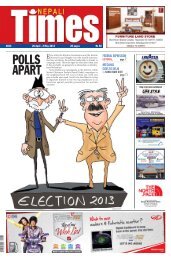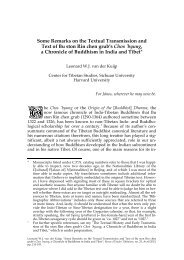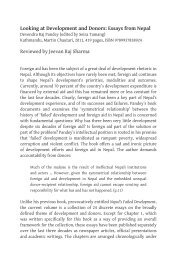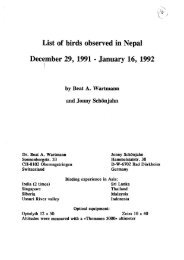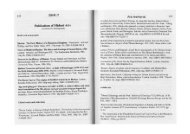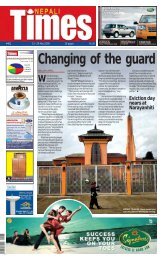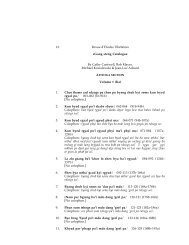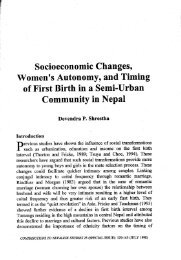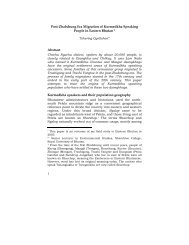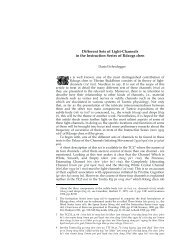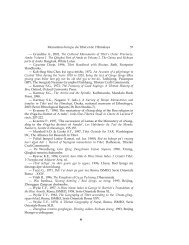Create successful ePaper yourself
Turn your PDF publications into a flip-book with our unique Google optimized e-Paper software.
42<br />
HOUSE ON RENT<br />
Ideally located in a private residential complex.<br />
Suitable for residence or office.<br />
Four bedrooms, living and dining and a separate<br />
annex with two rooms and a garage.<br />
Walking distance from the Holiday Inn Crowne Plaza and<br />
Lincoln School.<br />
For more details contact:Mr. Bhattarai<br />
Soaltee Mode, Kalimati, 4278743 (Morning).<br />
House on Rent<br />
An ideal and new family house for rent at Shankhamul, New<br />
Baneshwor with all modern facilities including:<br />
n West faced 2.5 storied fully furnished (optional) building in<br />
1 ropani compound with basktball court.<br />
n Ground floor with living (16x18), kitchen (10x10), dining (10x8),<br />
guest room (12x10), study room (12x12) and bathroom.<br />
n 1st floor with 1 master bedroom (14x14) with attached bathroom<br />
and dressing room (10x10), 2 bedrooms (12x12 each),<br />
bathroom and terrace.<br />
n 2nd floor with 2 rooms and big terrace.<br />
n Sufficient water supply (underground), hot water facilities<br />
(Solar), and a toilet outside the building.<br />
Rent negotiable, contact Shambu or Meena<br />
Tel.: 4782543, Email: mjoshi@kmtnc.org.np<br />
Last Word<br />
Thaw That Was Overdue<br />
When you start your armed<br />
movement questioning the<br />
fundamentals of a multiparty<br />
democracy, and then give the movement<br />
a strong republican twist every time public<br />
anger over the King’s action rises, you<br />
are more than likely to feel happy about<br />
the fallout between the parties and the<br />
King. You will even consider your action<br />
a grand success if you are able to cut<br />
a deep wedge between the two whose<br />
unity stands in the way of your<br />
ascendance, and a possible usurpation of<br />
state power.<br />
The Nepal Communist Party<br />
(Maoist), which now controls huge<br />
swathes of territory outside the district<br />
headquarters and urban centers, must be<br />
on a high. And we are not referring to<br />
their military strength here. The political<br />
parties and the Palace have never appeared<br />
so deeply polarized in the last 14<br />
years of democracy<br />
as they<br />
are now. This<br />
has given NCP<br />
(Maoist) the<br />
opportunity to<br />
make inroads<br />
in the hearts<br />
and minds of<br />
the people, especially<br />
in rural<br />
areas where<br />
feelings of exclusion<br />
remain high. Revolutions after<br />
all are as much about raising battle-hardened<br />
armies as about keeping your ranks<br />
motivated through the right noise. Emotions<br />
and symbols hold huge meanings.<br />
In hindsight, October 4 marks the<br />
beginning of a dark chapter in Nepal’s<br />
history. In refusing to see eye to eye, the<br />
political parties and the monarchy did<br />
enormous damage to each other through<br />
mutual recriminations. When King<br />
Gyanendra took executive powers after<br />
dismissing an elected government, the<br />
thinking was that absolute power would<br />
help resolve what the political parties<br />
had failed to do. Perhaps the solution lay<br />
in wielding the stick. In the vestiges of<br />
the Panchayat, the new regime found a<br />
ready constituency to champion its two-<br />
pronged strategy: advocate militarist approach<br />
to tackle the insurgency and vilify<br />
the parties (which was fine given the parties’<br />
colossal failure to win public confidence<br />
post-1990). In some foreign governments,<br />
notably the United States, the<br />
new regime even found allies who<br />
thought the insurgency would be swiftly<br />
resolved through a strong King backed<br />
by a powerful Army.<br />
Nineteen months on, and two appointed<br />
governments later, Nepal is as<br />
far away—perhaps farther—from finding<br />
a lasting resolution to the Maoist insurgency<br />
as it was when it all started. As<br />
a matter of fact, the long battle of attrition<br />
between the King and the parties<br />
has even handed the initiative back to<br />
the Maoists. It has hardly helped that the<br />
new regime is not seen to be an inclusive<br />
one and that there is widespread apprehension<br />
that political and civil rights<br />
are being rolled<br />
back. Thankfully,<br />
even our<br />
allies now seem<br />
to have realized<br />
so much, that<br />
legitimacy<br />
holds key to effectivegovernance.<br />
The<br />
United States<br />
last month<br />
called on the<br />
Palace and the parties to “unify—urgently—under<br />
an all-party government<br />
as the first step to restoring democracy<br />
and presenting a unified front against the<br />
terrorist insurgents.”<br />
We believe restoring the peace process<br />
should be a top prority for the unified<br />
front. We are encouraged by the recent<br />
turn of events that started with the<br />
King and the parties listening to each other<br />
in Nargarjun, though we would like to<br />
advise cautious optimism. For now, the<br />
parties and the King are at least talking.<br />
Editor<br />
MAY 30, 2004 | nation weekly


